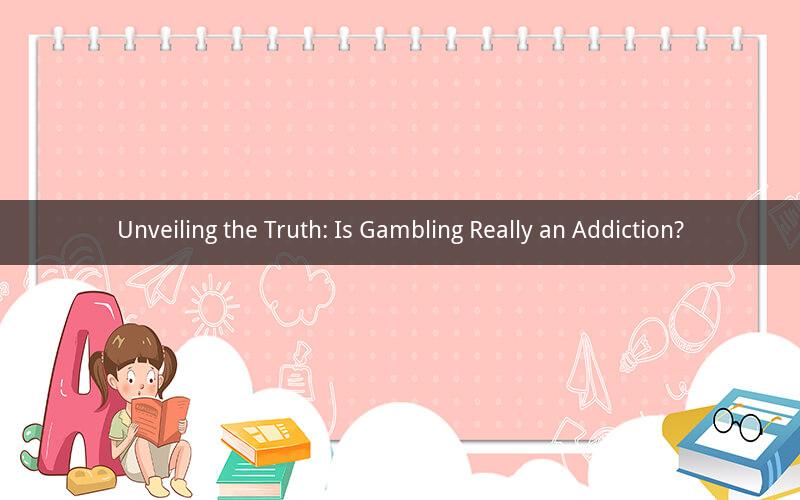
Introduction:
Gambling has been a part of human culture for centuries, captivating individuals with its thrill and potential for wealth. However, the question arises: Is gambling truly an addiction? This article delves into the complexities of gambling addiction, exploring its definition, symptoms, and the factors that contribute to its development. By understanding the intricacies of this issue, we can better comprehend the impact of gambling on individuals and society.
1. What is Gambling Addiction?
Gambling addiction, also known as problem gambling or pathological gambling, is a behavioral disorder characterized by an inability to control or stop gambling despite negative consequences. It is a chronic condition that can lead to significant harm in various aspects of an individual's life, including financial, emotional, and social well-being.
2. Symptoms of Gambling Addiction
Identifying gambling addiction can be challenging, as it may manifest differently in each individual. However, some common symptoms include:
a. Inability to control gambling behavior: Continual desire to gamble, despite repeated efforts to stop.
b. Preoccupation with gambling: Constant thoughts about gambling, planning for future gambling activities, or reliving past gambling experiences.
c. Escalating gambling: Increasing the amount of money, time, or both spent on gambling to achieve the desired level of excitement or to recover losses.
d. Risking more to win: Taking greater risks in gambling activities to recover losses or achieve greater rewards.
e. Lying to hide gambling: Deceiving family, friends, or professionals about the extent of gambling activities.
f. Withdrawal symptoms: Experiencing irritability, restlessness, or anxiety when attempting to stop gambling.
g. Neglecting responsibilities: Prioritizing gambling over work, family, and other important commitments.
3. Factors Contributing to Gambling Addiction
Several factors can contribute to the development of gambling addiction, including:
a. Genetic predisposition: Research suggests that there may be a genetic component to gambling addiction, making some individuals more susceptible.
b. Environmental influences: Exposure to gambling opportunities, such as casinos or online platforms, can increase the likelihood of developing an addiction.
c. Psychological factors: Individuals with certain personality traits, such as impulsivity or a need for excitement, may be more prone to gambling addiction.
d. Social factors: Peer pressure, family dynamics, or cultural norms can influence an individual's gambling behavior.
4. The Impact of Gambling Addiction
Gambling addiction can have devastating consequences on individuals and society. Some of the key impacts include:
a. Financial problems: Excessive gambling can lead to significant financial losses, causing individuals to go into debt or even bankruptcy.
b. Emotional distress: Individuals with gambling addiction often experience feelings of guilt, shame, and despair, leading to mental health issues such as depression and anxiety.
c. Relationship problems: Gambling addiction can strain relationships with family, friends, and partners, leading to isolation and loneliness.
d. Legal issues: Individuals with gambling addiction may engage in illegal activities to fund their gambling habits, such as theft or fraud.
e. Health problems: The stress and anxiety associated with gambling addiction can lead to physical health issues, including heart disease, high blood pressure, and sleep disorders.
5. Treatment and Support for Gambling Addiction
Recognizing the signs of gambling addiction is the first step towards recovery. Various treatment options are available, including:
a. Cognitive-behavioral therapy (CBT): CBT helps individuals identify and change negative thought patterns associated with gambling addiction.
b. Support groups: Joining support groups, such as Gamblers Anonymous, can provide individuals with a sense of community and support.
c. Professional counseling: Working with a mental health professional can help individuals develop coping strategies and address underlying issues contributing to their addiction.
d. Financial counseling: Financial counseling can assist individuals in managing their debts and developing a plan to regain financial stability.
Frequently Asked Questions:
1. Can gambling addiction be cured?
Yes, gambling addiction can be treated and managed effectively. With appropriate treatment and support, individuals can learn to control their gambling behavior and regain control over their lives.
2. Is online gambling more addictive than traditional gambling?
Online gambling can be more addictive due to its convenience, accessibility, and the potential for anonymity. The ease of access to online gambling platforms can make it more challenging for individuals to control their gambling behavior.
3. Can someone with a gambling addiction recover on their own?
While some individuals may attempt to recover on their own, seeking professional help and support from treatment programs and support groups can significantly improve the chances of successful recovery.
4. How long does it take to recover from gambling addiction?
The duration of recovery from gambling addiction can vary widely among individuals. Some may experience immediate improvements, while others may require ongoing treatment and support for several years.
5. Can gambling addiction affect children?
Yes, gambling addiction can affect children, particularly if they witness or are exposed to gambling behavior within their family or community. Children may develop gambling-related problems later in life if they are not educated about the risks and consequences of gambling.